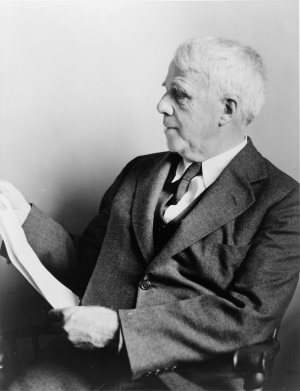Robert Frost 1874-1963

Robert Frost was born in San Francisco but moved with his family to Lawrence, Massachusetts after his father's death in 1885. His academic studies at Dartmouth College and Harvard were curtailed by financial constraints. He married in 1895 and after a series of family bereavements moved to Buckinghamshire, England in 1912 to take up farming.
During his time in England he became a friend of the pastoral poet Edward Thomas. His first book of verse, A Boy's Will, was published in 1913 and the second, North of Boston, a year later. He returned to the United States in 1915, thereafter devoting himself to poetry. A third book of verse, Mountain Interval, was published in 1916. He gained further recognition with New Hampshire (1923), Collected Poems (1930), A Further Range (1936) and A Witness Tree (1946), all of which won the Pulitzer Prize. Later works include A Masque of Reason (1945), A Masque of Mercy (1947), A Steeple Bush (1947) and In the Clearing (1962).
Frost's poetry has a haunting, philosophical quality to it, reflecting his personal solitude and a strong, comforting attachment to nature.
Works include
Books you might enjoy
 The Poetry of Robert Frost
The Poetry of Robert Frost
Robert Frost, Edward Connery Lathem (Editor)
Buy books related to Robert Frost at amazon.co.uk
Support this site
Please help us to improve this site by supporting the site on Patreon. As a supporter you will get access to the English Verse Discord server, where you can meet other poetry enthusiasts and help shape the development of the site.